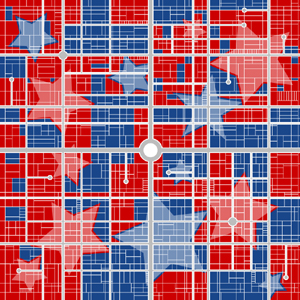'Independent state legislature' theory in spotlight as SCOTUS refuses to hear map disputes

Image from Shutterstock.
The U.S. Supreme Court on Monday turned down emergency Republican requests to block two court-drawn legislative maps, even as four justices said they were open to considering a doctrine that would increase legislative power over redistricting.
In orders here and here, the Supreme Court declined to block congressional maps adopted by state courts in North Carolina and Pennsylvania, report SCOTUSblog, Reuters, the Associated Press, the Washington Post and the New York Times.
The refusal to intervene is a victory for Democrats who may gain more seats under the court-drawn maps than the maps drawn by Republican-controlled legislatures.
The Supreme Court’s refusal to act is in line with the Purcell principle, which says federal courts generally should not change state election rules shortly before an election, said Justice Brett M. Kavanaugh in a concurrence to the refusal to block the North Carolina map.
But Kavanaugh indicated that the Supreme Court should, in the appropriate case, grant cert to consider what is known as the “independent state legislature” doctrine. Three justices—Justices Samuel A. Alito Jr., Clarence Thomas and Neil M. Gorsuch—also indicated their support for the doctrine in a dissent from the court’s refusal to act in the North Carolina case.
The doctrine could “effectively strip state courts of their power to protect voting rights under state constitutions,” SCOTUSblog reports.
Vox described the theory this way: “The independent state legislature doctrine derives from a deceptively simple reading of the Constitution, which provides that ‘the times, places and manner of holding elections for senators and representatives shall be prescribed in each state by the legislature thereof.’ A separate provision says that presidential elections shall also be conducted in a manner determined by the state ‘legislature.’
“Both clauses refer to state legislatures, not state courts or state governors, so the idea behind the independent state legislature doctrine is that the legislative branch of each state gets to decide how federal elections are conducted without any input whatsoever from the other branches.”
In the North Carolina case, the North Carolina Supreme Court had rejected the independent state legislature doctrine, according to the New York Times. The state high court said the doctrine was “repugnant to the sovereignty of states, the authority of state constitutions and the independence of state courts and would produce absurd and dangerous consequences.”
North Carolina Democrats had argued in the Supreme Court that applying the independent state legislature doctrine would “betray” the pledge made in Rucho v. Common Cause. That 2019 Supreme Court decision held that challenges to election districts drawn to benefit a political party are a political issue beyond the reach of federal courts.
In the majority decision, Chief Justice John G. Roberts Jr. said that, although federal courts couldn’t act in partisan gerrymandering cases, state courts could by applying provisions in state statutes and constitutions.
But state courts’ ability to act could end if the Supreme Court adopts the independent state legislature doctrine.
The New York Times points out that the votes of four conservative justices would be sufficient to add a case on the doctrine to the court’s merits docket.
“But it takes five votes to prevail,” the New York Times points out. “The swing vote would almost certainly belong to Justice Amy Coney Barrett.”
The cases are Moore v. Harper and Toth v. Chapman.
Write a letter to the editor, share a story tip or update, or report an error.


